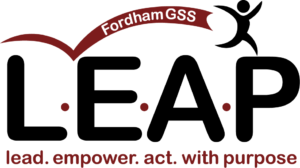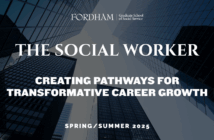As a social worker, at some point you will perform a needs-assessment. When a situation is challenging, you must be the first to ask, “what’s the need?” This is the initial step to overcoming any obstacle.
For Kara Byron, GSS ’19, that “need” came from her hero.
“My father created a legacy for himself,” she said. “He wanted everyone around him to enjoy life.”
In 2015, Byron got news that her father had been diagnosed with a neurodegenerative disease, one whose symptoms reflect the progressive loss of function and death of different types of nerve cells in the brain and spinal cord, and will inevitably lead to the progressive loss of autonomic functions in the body.
An undergraduate at the University of Southern California at the time, Byron would soon be set on a path that changed her life forever.
At that point, she knew the need. Only one question remained.
How?
Finding Answers Through Social Work
In 2013, Byron began her undergraduate degree at USC with an undecided major, but quickly decided to pursue psychology with a minor in forensics. A mix of fascination with addiction and crime, combined with the desire to understand people at their very core, drew her to find the science behind the struggle.
“I was fascinated with the ‘why,’” she said. “Why do they have these issues? Why haven’t they gotten help? Are they really bad people, or is there something else behind it?”
It was that curiosity which led her to take a social work course, “Adolescent Gang Development,” during her senior year. Byron said she didn’t know much about the social work profession at that point, but it didn’t take long for her to realize the field aligned with her passions.
“The professor defined social work and the holistic modalities used to understand people, groups, communities, and families and it was so interesting,” she said.
It was in this class that Byron learned what social work was really about: looking at the influences and factors on a micro, mezzo, and macro level, and forming actionable solutions to help the individual, group, community, or family involved.
“[The experience] turned into, ‘wow social work encapsulates everything that I want to do. I want to go on this path and learn more.’”
Byron spent that semester working with local gang members in the Compton area. The experience solidified her interest in the social work profession, and she knew her path was headed toward an MSW.
Then, her father fell ill.
A Family Needs-Assessment
Multiple System Atrophy (MSA-c) is a progressive neurodegenerative disorder characterized by a combination of symptoms that affect both the autonomic nervous system (the part of the nervous system that controls involuntary action such as blood pressure or digestion) and movement, according to the National Institute of Neurological Disorders and Stroke.
Byron’s father, a successful businessman in his 50s at the time, wasn’t quick to accept the limitations of the disease.
“He exceeded all the doctors’ expectations because of his spirit,” Byron said in an interview with Good Grief podcast.

Byron with her father. Photo courtesy of Kara Byron.
After graduation at USC, Byron was still interested in pursuing a path in social work. She still wanted to find out that “why.” But she needed to be close to dad.
“I knew that wherever I was going to spend the next two years, I wanted to be close to him,” she said.
So, she headed back across the country and enrolled at Fordham GSS, headed for the next challenge. But no matter what, she’d be by her father’s side.
Discovering a ‘Social Work Stigma’
In her time at GSS, Byron found herself facing a situation over and over again, one she called the “social work stigma.”
She described the stigma as one that says social workers make no money, and that there are only certain paths to travel once you receive your MSW degree.
“The main driver of this industry is humanity and relationships and helping others, but you also need to sustain a life for yourself,” Byron said. “When people view themselves as though they shouldn’t make enough or that they aren’t worthy enough, then they embody that. I wanted to reduce that stigma and help people feel good about themselves and our profession — instead of the opposite.”
Byron sought to break down the barriers of tradition, carve a different path with her degree, and help others thrive along the way.
“When people look at social work, they say two things: they say, ‘oh you’re a social worker, so you must work in [job type]A, B, or C, and you make no money,” she said. “That was constantly what people would say to me, not, ‘oh my god what do you do and are you loving it and feeling fulfilled?’”
She thought the questions were all backwards and stemmed from this stigma. This, in turn, forced students to create ceilings for themselves and their careers.
“[How can] students thrive and figure out their passions if they’re feeling so limited all the time?” she asked.
So, another need arose: empower social work students to be more than what a stigma says they are.
The how: create a platform to help them.
Forming LEAP
Byron formed the idea for her Lead, Empower, Act with Purpose (LEAP) program while sitting in class, discussing the stigma issue. What could be done to counter these stereotypes? How could she and her classmates break down the barriers that seemed to appear once they began the MSW program?
 LEAP was Byron’s answer. Through this program, Byron reached out to professionals in the tri-state area who had gotten their MSW degrees, but whose careers didn’t fall into one of the more “traditional” social work paths. She contacted lawyers, entrepreneurs, and even Academy Award winning filmmakers to come speak at LEAP events.
LEAP was Byron’s answer. Through this program, Byron reached out to professionals in the tri-state area who had gotten their MSW degrees, but whose careers didn’t fall into one of the more “traditional” social work paths. She contacted lawyers, entrepreneurs, and even Academy Award winning filmmakers to come speak at LEAP events.
“I thought, ‘there’s so much more out there that social workers can do and be recognized for,’” Byron said. “I wanted to spearhead some initiative starting here at Fordham where we get people in other industries to acknowledge us, to accept us, and to understand that we bring a critical skillset to whatever work or environment we’re in.”
The series took off. LEAP events scaled to over 100 people and brought a fresh perspective to students entering the profession, combining both the traditional aspects learned in class and a look toward the future outside the linear path. Byron fundraised to supply an engaging atmosphere for each event, fit with a bar and catering service. Her vision was to create a relaxing space for networking — an activity she felt the field lacked.
“People network in finance, tech, and business — why don’t people network in our industry?” she asked. “Students appreciated it because in class you learn about what social workers have done traditionally and historically, but you don’t really get the chance to talk with classmates about the trends and where we’re going.”
Becoming a Parent’s Caretaker
While completing her degree and acting as the face of LEAP’s events, Byron also took on the responsibility of caretaker to her father.
As his condition worsened, Byron’s father became completely dependent on his daughter to survive. She would commute to campus from her home in New Jersey and, in her spare time, research the disease and how to best provide care.
Byron helped her family build out a private duty nursing company for her father. She spent countless hours over the years not only recruiting, staffing, and training nurses, but also building relationships with those nurses and ensuring her father had the overall best quality of care.
“I had to learn how to become a nurse without actually becoming one,” she said in the Good Grief interview. “I had his life in my hands 24/7.”
In this time, boundaries were crossed. Byron’s role reversed from daughter to a sort of parent, and she had to constantly watch over her father for his own safety. This included activities such as bathing, dressing, and walking him.
Byron did whatever she could to keep spirits high. She’d put together intimate dinners and themed gatherings for her father, their family, and his friends. She called this her way of “making meaningful moments.”

A meaningful moment. Photo courtesy of Kara Byron.
“I would create these experiences for my family and my father’s friends so that his normal was normal, and so he could live life to the fullest every day, experiencing everything he’d want to experience,” she said. “Whether it was themed nights or dinners or intimate celebrations with my sisters getting married, he could be a part of everything and not feel limited or that he couldn’t participate.”
This was a man who built himself up from nothing. Who never missed a recital or sports game, even if it meant flying home from a work meeting in Chicago that day — and always put family first. Who sent his daughters Valentine’s Day cards every year without fail, even when they studied abroad on the other side of the world.
He’d lost his ability to speak, but not to connect with the ones he loved. Byron said the two communicated in other ways, making it work however they could. Subtle things like eye movements became the only dialogue that mattered.
Graduation from GSS
There was not a more deserving commencement speaker in the Fordham University Graduate School of Social Service class of 2019 than Kara Byron.
In front of 7,000 people, she conquered her fear of public speaking and taught everyone in attendance about “Byron’s Law of the Four P’s,” passed onto her by her father, who watched from the audience.

Byron making her commencement speech at graduation. Photo courtesy of Kara Byron.
“The Four P’s are preparation, persistence, passion, and purpose,” Byron said. “Utilizing this framework in every aspect of life will take you far.”
Throughout the speech, Byron steals glances to her right and smiles. She speaks about how everyone has their “someone,” and hers was in the crowd, cheering her on, like he always had.
“My someone inspired me to follow my hopes and dreams,” she said. “He encourages me to never settle, but to take charge of my life.”
And she had. In the past few years, Byron had become the recipient of two degrees, made countless connections and moments with others, discovered her entrepreneurial spirit, and dedicated her days to the person she loved most.
Her words that day had power — but her expression, the light in her eyes, carried the world.
Self-Care in Times of Turmoil
Shortly after graduation, Byron worked for GSS directing alumni relationships as a consultant. Due to some family health challenges and her father’s progressed condition, she stepped down from her role at GSS and continued as his caretaker.
Byron lost her father to MSA-c in May of 2020.
She noted that her support system in this time has been incredible. But the past four years of her life had been a perpetual state of uncertainty, and it was time to take a step back.

Another of Byron’s meaningful moments. Photo courtesy of Kara Byron.
“I’ve done a lot for myself in these past eight months,” she said. “I’ve worked toward a place to acknowledge and understand exactly where I’m supposed to be.”
She needed a breath. From worry. From pressure. This is something we all need to remind ourselves — especially social workers. Sometimes it’s hard to conduct a mental health needs-assessment on yourself, when so many depend on you.
This self-care can be hard to implement in a world where so much is expected of us. Add the overflow of information from pedestal-like platforms like social media, and it’s hard to feel as though a break is ever deserved.
“The culture we live in puts a lot of pressure on people about timelines and where they should be – professionally and personally,” Byron said. “You’re this age; what are you doing? Where are you working now? Who said those are the appropriate questions?
“Oftentimes, people are uncomfortable talking about death and grief, and so most don’t understand that it’s a process. And everyone’s process and journey with grief is different. I’m so proud of everything I’ve done, of the person I am, and of where I’m going in life.”
Looking Toward the Future
Byron was never your traditional social worker. She never followed a vertical path.
Both her experience with her father and non-linear approach to social work shaped how she viewed life.
“I don’t have one path,” she said. “And without those experiences with my dad, I wouldn’t be who I am today.”
Byron’s goal is to uplift people and enhance their quality of life, and in doing so, make meaningful moments — both for herself and others. She said it’s important to celebrate the milestones in life, but to make sure those in-between times are not forgotten.
Because the in-between is where we really live.
“Time is a gift; it’s precious,” she said. “If you don’t celebrate the time in-between, you’re going to regret it.”



